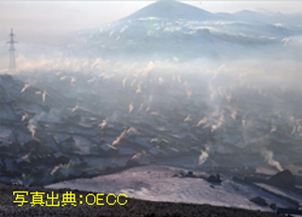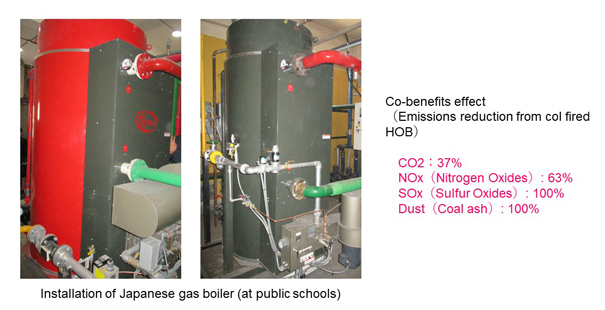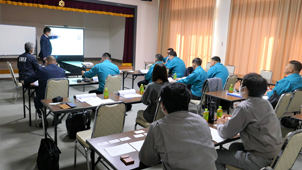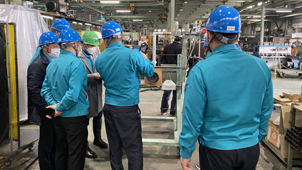
Activities
Co-benefits Approach
Promotion of the Co-benefits Approach
Coal that is used for heating in Mongolia results in severe air pollution. This is especially the case in Ulaanbaatar, the country’s capital city, where the rate of air pollution has deteriorated sharply since around 2010. The average concentration of PM2.5 in 2016 was 5 times more than the World Health Organization’s (WHO) annual mean concentration guideline, reaching 80 times the guideline in December of the same year. The number of deaths caused by air pollution in Mongolia that year was approximately 3,700. To overcome this situation, OECC has engaged in co-benefit-type environmental cooperation since 2013 to simultaneously reduce air pollutants (SOx, NOx, Dust) and GHGs (CO2 and its equivalents). With a focus on district heating systems, we are working with the governments and companies of Japan and Mongolia to develop projects that convert coal-fired boilers to gas boilers resulting in heat sources that do not emit air pollutants.

Overview of Ulaanbaatar city in winter 2016
Demonstration of Co-benefits Effect in Mongolia
Mongolia has a high dependence on coal as a heating fuel. Since 2010, air pollution has been a serious problem due to an increase in coal burning in rapidly populated urban areas. Starting in 2013, OECC has been addressing this problem by increasing the efficiency of coal-fired hot water supply boilers (HOB) which is one of the causes of air pollution. In 2016, we achieved a 28% reduction in CO2 emissions, a 76% reduction in NOx pollution, a 28% reduction in SOx pollution, and a 59% reduction in soot and dust compared to conventional HOBs, all due to reduced coal use, and resulting in proven emissions reduction. Since 2018, we have supported a project to convert HOBs to LPG-fired hot water supply boilers (gas boilers) that do not emit SOx and dust in accordance with the Mongolian government’s policy. The introduction of Japanese gas boilers has proven to reduce CO2 emissions by 37% and NOx emissions by 63%.
Activities from 2013 to 2016

Activities from 2018 to 2022

Implementation of Training in Japan
In order to reduce serious air pollution in Ulaanbaatar, OECC has introduced gas boilers manufactured in Japan to public schools and provides support for the demonstration tests. The heating supply is a critical infrastructure that protects the lives of children in an environment of minus 30 degrees Celsius in the winter of Mongolia, and the gas boiler used in this demonstration is playing a direct role in the heating supply. For this reason, it is necessary to avoid breakdowns, stoppages, and gas (LPG) leaks through appropriate construction and management of gas boilers. OECC has invited Mongolian gas boiler operators to Japan to provide training on installation methods, gas boiler structures and specifications in addition to maintenance management methods.

Technical Training

Site Visit
(manufacturing plant)
Promotion of Co-benefit Projects
OECC has been holding talks with government officials and companies in Japan and Mongolia to continue supporting the development of projects that are expected to have co-benefits in Mongolia, making use of our knowledge and experience with gas boilers. OECC contributes not only to reducing emissions of GHGs and air pollutants, but also to enabling developing countries achieve sustainable development through environmentally friendly projects. Examples of these projects include “Introduction of amorphous transformers to Ulaanbaatar Electricity Distribution Company”, “Introduction of hydrogen-fired gas turbine generators to Mongolia No. 2 thermal power plant” and “Production of hydrogen using surplus power of thermal power plants”.
